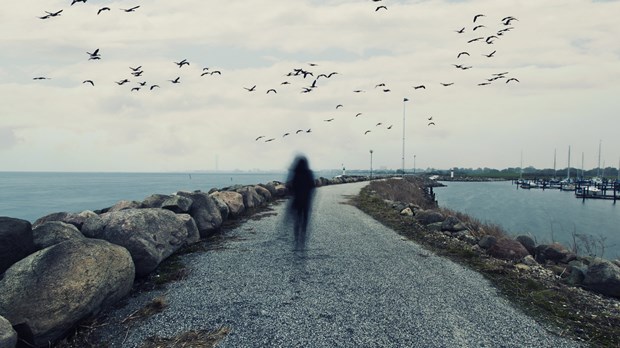The Loneliness Epidemic

Mother Teresa once said the feeling of being unwanted is the most terrible form of poverty. She also described loneliness as the leprosy of the modern world. She piercingly put to words what nearly 40 percent of American adults admitted to feeling in a 2010 survey, up from 20 percent in the 1980s. Our culture is increasingly becoming one of isolation, anonymity and a sinking feeling of being unloved and unknown.
Connie Kinder, a Christian therapist in Nashville, says 85 to 90 percent of her clients wrestle with loneliness. She works at a local counseling center that offers affordable services at a sliding-scale rate, while also running her own private practice. No matter her clients’ socioeconomic status, loneliness is something that touches all people, she says. “Oftentimes, the symptoms can be anxiety, depression, or anger, but as I narrow it down to the core issue, it usually centers around the pain of not being connected relationally.”
The Prevalence of Lonely People
Although loneliness is something the vast majority of people wrestle with, hardly anyone wants to openly address it, says John Ortberg, a Christian author and pastor of the multi-site Menlo Park Presbyterian Church in the San Francisco Bay Area. “People will readily acknowledge being too busy because that makes them sound important,” he says. “But to say ‘I’m lonely’ is kind of like saying ‘I’m a loser,’ and nobody’s going to like a loser.”
In his most recent book, Soul Keeping, Ortberg examines what it means to have a healthy soul connected to God and to others amid a culture starved by busyness and the pursuit of status and wealth. The loneliness so many people experience has intensified as the forces that used to keep individuals bonded have disintegrated, he says.
“People are much more transient and mobile now, so they move more often,” he explains. “Family strength is much weaker than it used to be and divorce rates are much higher. Beyond that, the sense of belonging to a clan—such as children living in close proximity to their grandparents—also has lessened, as has the presence of church in many peoples’ lives.”
Referencing Robert D. Putman’s well-known book, Bowling Alone, Ortberg points out that connectedness among Americans has steadily declined with every generation since World War II. And according to renowned psychologist Martin Seligman, this has resulted in the meaning of life being narrowed down to the self. The self, Ortberg believes, is way too small a unit to be able to bear the weight of a life alone.
Struggling Through Loneliness
Ortberg himself admits to having struggled with a deep, secret loneliness in his earlier years as a pastor. “It’s easy to hide and project an image, and pastoral ministry can sometimes actually reinforce that tendency and reward it if it’s done well,” he says. “What that leaves starved is the desire inside the soul to be fully known. And I can only be fully loved if somebody fully knows me. The degree to which I’ve felt unknown and unloved is the degree to which I have felt lonely.”
Author and speaker Erin Davis says she experienced similar feelings several years ago when her husband transitioned from a youth ministry job to working at a parachurch organization.
“For a long time, we had a very full calendar with many people in our lives,” Davis says. “But with the job change, those relationships ceased to exist. There was no big falling out, no fighting. But it was like the emergency brake got pulled on our lives. I realized my relationships had been built on convenience, and when that was removed, the friendships didn’t exist anymore. I felt as if no one really knew me or would really be there for me if I needed them.”
Davis went on to write about her season on loneliness in her book, Connected: Curing the Pandemic of Everyone Feeling Alone Together. In her research, she not only discovered how many Christians are feeling lonely these days, but she also found that men and women often can experience the most intense loneliness in their marriages. Despite the appearance of connectedness through a shared life, many women admitted to Davis that they felt unknown by their spouse. “That’s a pretty lonely place to be,” she says.
In her practice as a therapist, Kinder says at least 50 percent of her clients are spouses seeking counseling. “Those can be some of the loneliest people I see because they are struggling so badly to connect with each other.”
Facing Loneliness
Davis believes the first step in facing loneliness is evaluating the condition of one’s relationships. “I’m not sure we know how to form deep relationships as a culture,” she says. “We keep things on the surface because it’s safer. We want our relationships to be very convenient, and deep relationships aren’t convenient at all. They require vulnerability, which can be painful. Yet if those closest to us have never seen us take off our masks and witness our hearts break, then how close are we?”
In confronting his own loneliness, Ortberg says he developed relationships with a few friends before whom he determined he would have no secrets. “I began keeping a moral inventory of my life, my own history of sin and redemption. I sat down with these friends and said, ‘I want to read you a list of the stuff of which I’m most embarrassed and ashamed.’ That actually led to me experiencing a deeper level of connectedness, intimacy, love, and grace. It’s been hugely helpful.”
To this end, Davis believes these kinds of interactions must be intentionally pursued. “We don’t need to have the idea that transforming relationships are supposed to fall into our laps,” she says. “They take intentionality, cultivation, and a willingness to engage in conflict and not walk away when things feel tense or draining.”
She points to how helpful the model in Scripture can be of older women mentoring younger women—but only if women from both age groups are willing to pursue this type of connectedness. “We’re all waiting on someone to approach us and initiate a relationship, and it’s not happening,” she says. “Yet God’s model is for women to be involved in each other’s lives. So we’ve got to be willing to put ourselves out there.”
As a therapist, Kinder believes it is first crucial for individuals to understand their own stories—past wounds, experiences, and feelings of inadequacy—in order for them to accept God’s grace and then accept themselves. “Then we’re able to move toward others, empathize with them, and move through boundaries of isolation,” she says.
Julia Halford, who also offers counseling services in Nashville, agrees. “You can go to all the Bunco parties, book clubs, or girls’ night out dinners and try to connect, but the connection will be most true if you come from a place of feeling connected to God and yourself,” she explains.
Otherwise, shame can play a big role in perpetuating loneliness. “We compare ourselves with others and think, ‘Everybody else is doing this, or has that, or looks this way,’” Kinder says. “That kind of comparison just builds up a sense of shame and we hide. We try to fight the inadequacy we feel while putting out an image that we’re okay. Meanwhile, isolation builds.”
Creating Whitespace
The holidays in particular can increase this sense of shame, Kinder says. “There’s so much stress and pressure about what we think Christmas should look like. Whether we’re part of the perfect Hallmark family, or have lots of gifts under the tree, or take the perfect vacation. We believe we’re not okay if we’re not having the experiences everyone else seems to be having.”
Masking perceived imperfections while replacing connection and community with success, power, and the accumulation of things is what makes people lonely, Kinder says. It even translates into how parents can relate to their children.
“So often we fall into the practice of thinking we need to provide more things for our children or allow them to participate in every kind of experience or activity possible,” she says, “rather than realizing kids need us to nurture them, feed them, and understand what they feel in order for them to know we’re with them.”
This requires slowing down, something many people fear will only make their loneliness more acutely felt. The opposite is true, says Ortberg. “Hurry accelerates loneliness.”
That’s why Davis believes leaving room for whitespace is so crucial in combatting loneliness. “Busyness doesn’t allow our relationships to go deep because we’re constantly on the move,” Davis says. “There’s something about aimlessness in relationships that is vital. Just going for a walk, spending the day, letting time unfold in an unscheduled manner—these are ways relationships really form. We need to have blocks on our calendar that aren’t scheduled, so if the opportunity arises to spend time with a friend, care for someone who is sick, or hone in on the needs of a child, we actually have time to do so.”
The Illusion of Connectedness
Evaluating the amount of time spent online can also play a role in unearthing causes of loneliness, Davis says. She admits she got to a point herself where she couldn’t even wait at a stoplight without checking her Twitter account. “I don’t think technology is the sole root of the problem, but I do believe if most of us were honest, we’d admit that many of our Facebook friends or Twitter followers aren’t real friends. So it presents us with an illusion of connectedness to others that doesn’t truly exist.”
It also keeps people coming back for more. While researching her book, Davis discovered data that unveiled how online activity delivers tiny hits of dopamine, a hormone and neurotransmitter that gives the brain a sense of a reward, each time someone receives an email, is re-tweeted, or gets any kind of recognition on Facebook.
“This is what makes technology so addicting,” she says. “But human, face-to-face relationships produce much greater amounts of dopamine, without the addiction. I’m not calling for a cease-fire on technology, but I do think we need to get real about whether it’s really scratching our itch for connection.”
Ortberg believes one of the most effective cures for the drain that comes from a hurried, frantic pace in this technological age is to set aside regular periods of time to spend in solitude—an idea that, at first blush, people struggling with loneliness might fear will exacerbate their feeling of isolation.
“Ironically, one of the things you discover in solitude is that you’re not alone,” Ortberg asserts. “A big difference between Jesus and most folks in our day is Jesus was often alone but never lonely. We are often lonely but hardly ever truly alone.
“A lot of people wonder what they’re supposed to do in a period of solitude,” he continues. “The main point isn’t what to do, but what not to do. We don’t hurry or try to produce. Our bodies and minds realize we still have worth as human beings when we’re not doing anything, and we realize that God and the world get along okay without our striving. We begin to realize how much of our ‘to-do’ list is about our ego more than anything else. Eventually, our souls begin to rest, and we discover we’d rather live this way. Instead of obligation, solitude becomes a lifeline.”
A Catalyst for Change
While loneliness is painful, it can also serve as a catalyst for change. “Loneliness motivates us to seek relationships and move toward people,” Kinder says. “If instead of saying, ‘There’s something wrong with me because I’m feeling lonely,’ what if we viewed it differently? What if we thought, There’s something really right with me because I’m lonely. I’m made for connection, and I need to step out, grow, and seek other people who can help me on this journey.”
Ultimately, loneliness should point believers to the person of Christ, says Anette Ejsing, author of The Power of One. Ejsing worked as a college professor in the U.S. for seven years before returning to her native Denmark to serve in a clergy role for Copenhagen Prisons. In her own season of intense loneliness, she says she began to turn away from God as she begrudgingly held him accountable for her despair.
“I couldn’t understand why I was so lonely since I belonged to God and all his promises were mine,” she says. “For years I prayed for marriage and a sense of feeling at home. I grew more and more desperate when God didn’t answer those prayers.”
Eventually she repented of her despair. She realized she’d longed for God’s good gifts more than she longed to know God himself.
“I wanted satisfaction elsewhere, when the hope is always Christ himself,” she says. “We may never have everything we desire, but God is always still able to communicate his perfect love for us if we open ourselves to it. He will meet us in our loneliness and never disappoint the trusting child. When we put our hand in his, he will always give us the deepest desires of our heart, even if we don’t get what we want. As we let go, we can trust him to be the ultimate fulfillment of those desires.”
Read more articles that highlight writing by Christian women at ChristianityToday.com/Women
 Read These Next
Read These Next

 Lonely at the Top?Find the encouragement you need when leadership feels heavy
Lonely at the Top?Find the encouragement you need when leadership feels heavy
 Discipleship Through CommunityLearning to trust others can be the best way of growing in Christ.
Discipleship Through CommunityLearning to trust others can be the best way of growing in Christ.
 Hope for Single ParentsLike me, you can find joy in brokenness.
Hope for Single ParentsLike me, you can find joy in brokenness.








 Homepage
Homepage
